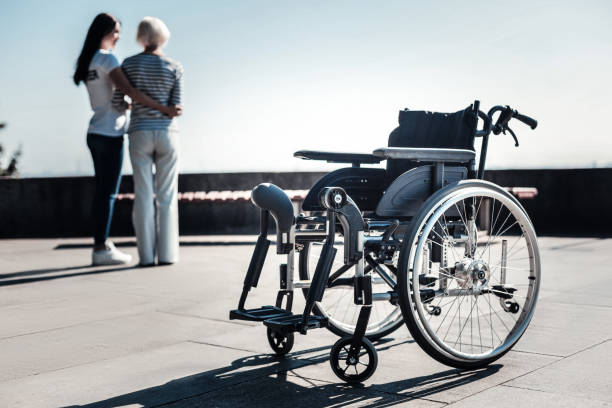Choosing the right wheelchair can be life-changing—enhancing independence, boosting confidence, and improving daily comfort. But with so many options available, how do you decide what’s best for your lifestyle and mobility needs? Whether you're recovering from an injury, living with a disability, or assisting a loved one, finding the right fit is key. In this guide, we’ll explore the most important factors to consider when selecting a wheelchair that’s both functional and empowering.

Manual Wheelchairs: These are self-propelled or pushed by someone else. Ideal for users with upper body strength or caregivers, they are lightweight and easy to transport.
Power Wheelchairs: Battery-operated and controlled with a joystick, these are great for people with limited strength or stamina. They offer ease of movement, especially indoors.
Transport Chairs: Lightweight with smaller wheels, these are designed for short-term use and are mostly pushed by someone else.
Standing Wheelchairs: These allow users to rise to a standing position, aiding in circulation and offering a psychological boost by enabling eye-level interaction.
Seat Width and Depth: Make sure the seat size fits your body to prevent pressure sores and discomfort. A proper fit supports posture and improves mobility.
Weight Capacity: Always check the chair’s weight limit. Heavy-duty models are available for higher weight requirements without compromising safety.
Adjustability: From armrests and leg rests to back height and seat angle, customizable features add long-term comfort and prevent strain.
Portability and Storage: If you travel often, a foldable, lightweight wheelchair is more practical. Ensure it fits in your vehicle or home storage space.
For Active Users: Consider a sports or ultra-lightweight manual wheelchair. These offer durability and flexibility for outdoor or active lifestyles.
For Home Use: Power wheelchairs with tight turning radii are great for indoor navigation, especially in smaller living spaces.
For Travel Needs: A compact, collapsible transport chair is ideal if mobility is needed only occasionally or during trips.
If you're looking for a reliable mobility wheelchair that meets your specific lifestyle needs, it’s essential to invest in one designed with both performance and personal comfort in mind.
Also, ask questions like:
Companies like mobility medical equipment suppliers offer trained professionals who can help match you with the right solution, including insurance billing assistance and product training.
Understanding Different Types of Wheelchairs
Wheelchairs come in various types, and each serves a unique purpose. Knowing your options helps narrow your search and ensures the best match.Manual Wheelchairs: These are self-propelled or pushed by someone else. Ideal for users with upper body strength or caregivers, they are lightweight and easy to transport.
Power Wheelchairs: Battery-operated and controlled with a joystick, these are great for people with limited strength or stamina. They offer ease of movement, especially indoors.
Transport Chairs: Lightweight with smaller wheels, these are designed for short-term use and are mostly pushed by someone else.
Standing Wheelchairs: These allow users to rise to a standing position, aiding in circulation and offering a psychological boost by enabling eye-level interaction.
Key Features to Look For
When choosing a wheelchair, comfort and support are top priorities. Here are essential features to evaluate:Seat Width and Depth: Make sure the seat size fits your body to prevent pressure sores and discomfort. A proper fit supports posture and improves mobility.
Weight Capacity: Always check the chair’s weight limit. Heavy-duty models are available for higher weight requirements without compromising safety.
Adjustability: From armrests and leg rests to back height and seat angle, customizable features add long-term comfort and prevent strain.
Portability and Storage: If you travel often, a foldable, lightweight wheelchair is more practical. Ensure it fits in your vehicle or home storage space.
Choosing Based on Your Lifestyle
Your daily routine and environment play a major role in determining the right wheelchair.For Active Users: Consider a sports or ultra-lightweight manual wheelchair. These offer durability and flexibility for outdoor or active lifestyles.
For Home Use: Power wheelchairs with tight turning radii are great for indoor navigation, especially in smaller living spaces.
For Travel Needs: A compact, collapsible transport chair is ideal if mobility is needed only occasionally or during trips.
If you're looking for a reliable mobility wheelchair that meets your specific lifestyle needs, it’s essential to invest in one designed with both performance and personal comfort in mind.
The Importance of Professional Guidance
Don’t make the mistake of choosing a wheelchair without consulting a healthcare professional. Occupational therapists or rehabilitation experts can guide you through a personalized selection process. They assess your physical condition, posture, and day-to-day requirements to ensure a long-term match.Also, ask questions like:
- Will you be using it indoors, outdoors, or both?
- Do you need postural support or specialized cushioning?
- Who will be operating the chair—yourself or a caregiver?
Where to Buy: Choosing a Trusted Supplier
When purchasing a wheelchair, always go through a reputable medical supplier that offers customization, fitting support, and after-sales service. Avoid the temptation to order online without proper sizing or support consultation.Companies like mobility medical equipment suppliers offer trained professionals who can help match you with the right solution, including insurance billing assistance and product training.
Tips for Long-Term Wheelchair Use
Here are a few tips to maintain your wheelchair and ensure long-term usability:- Regular Maintenance: Check tires, brakes, and batteries (for power chairs) frequently.
- Hygiene and Cleaning: Keep your cushion and frame clean to prevent skin issues.
- Training and Safety: Learn how to navigate slopes, curbs, and uneven surfaces safely.
- Posture Checks: Reevaluate your posture and support needs periodically as your condition or lifestyle changes.
